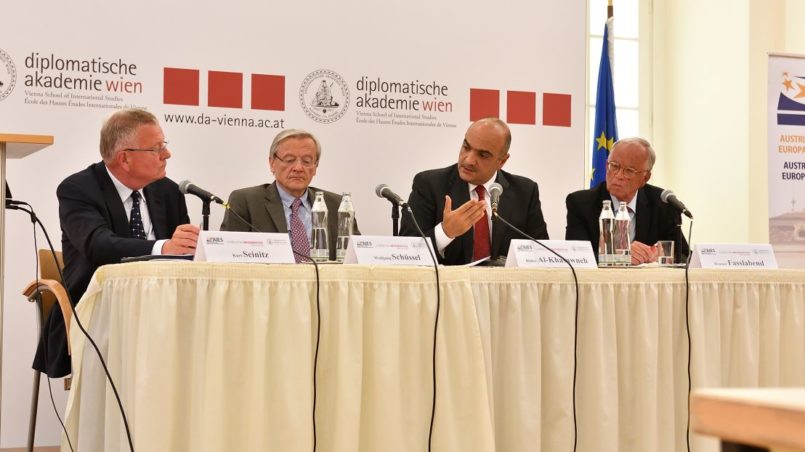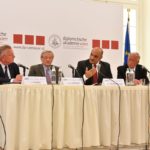Jordan – Kingdom of peace?

Event data
- Datum
- 31. 5. 2016
- Host
- Diplomatische Akademie Wien
- Location
- Diplomatische Akademie, Festsaal
- Event-type
- Podiumsdiskussion
On May 25, Jordan celebrated the 70th anniversary of its independence. Also, this year marks the hundredth anniversary of the Arab revolution – the revolt of the Arabs against the Ottoman Empire, also called the uprising in the desert.
Jordan lies between Iraq, Saudi Arabia, Syria and Israel – one of the most unstable regions of the world. Still the local royal house of the Hashemites (popular, unlike in Saudi Arabia), holds the country together relatively successful. King Abdullah II., like his predecessors, wears “two hats” – meaning that he rules the peoples of the west Jordan – especially the Palestinians – as well as the East Jordan. Jordan is the only Arab country to have granted citizenship to Palestinians. It is also the only country that still has the same form of government as it did when established – even if after the loss of the West Bank in the Six Day War of 1967, there was an adaptation of the constitution. The country’s institutions are democratic, there are regular elections, opposition (The Muslim Brotherhood have a seat in parliament) is permitted as well as demonstrations. The different peoples define their identity through the Jordanian state, which is also evident in the very mixed Jordanian army. The political system is inclusive – although freedom of expression is not up to Western standards, but relatively well developed for an Arab country – at least according to the ambassador. The current King invests heavily in the young and their education. The new Prime Minister Hani Al-Mulki, was actively involved in the negotiations which led to a peace treaty with Israel in the Washington Declaration in 1994. This contract is not without controversy, yet the majority of Jordanians are behind it.
The kingdom has a very young, rapidly growing population, mainly due to the influx of refugees from neighboring conflict areas. 1.4 million Syrian refugees alone – for whom the country provides free education and health care – are living in Jordan. 1987 the country had 2.7 million inhabitants, today there are 9.5 million. The capital Amman had 350,000 inhabitants in 1991, currently about 3.5 million. The country is heavily dependent on foreign aid. Only 80% of the budget balance is sourced by the country itself, about 10% come from international aid payments, and for the rest debts must be incurred. One reason for this situation is that the two major trading partners to Jordan, Syria and Iraq, are in shambles. In Addition, the main trade route running to Europe leads through Syria. Furthermore, expensive oil must now be introduced to the energy supply. Cheap natural gas from Egypt used to be the main energy supplier. With the help of new legislation, Jordan wants to bring foreign investment into the country. In addition to the precarious financial situation, both in the refugee camps (here, 10-15 billion Euros per year are required and only a part of it comes into the country through UNHCR and other organizations) as well as for the local population, the supply of water is one of the largest current and future problems.
The Arab Spring left its mark on Jordan in a relatively nonviolent manner. The ambassador assesses that the dialogue between politics and the population is the main reason. Two years ago, King Abdullah II. organized an event to protect religious minorities. This shows the position of Jordan to act as mediator in different conflicts, which is recognized in the Arab world as well. With Israel, there is a pragmatic approach (the ambassador speaks of “our Israeli friends”), in the Palestinian question Jordan seeks a two-state solution. The often-touted Arab community state is possible, but given the current situation, more of a nightmare leading to chaos – see Syria, Somalia or Yemen. Currently the discussants do not locate an integration trend.
The Jordanian ambassador does not believe in conspiracy theories, claiming the western world was trying to destroy the Arab countries and the Middle East. This statement is not too surprising, given the close relations of Jordan to the west, since 1996 at least. He sees the chaotic development in recent decades due to the fact that the countries of the region never had the chance to learn democracy and to develop peacefully. The Middle East needs an organization like the OSCE. The Arab League does not seem to be suitable for this purpose. Even if the Palestinian issue is central to many conflicts – for the IS it is the fig leaf / the excuse for their actions – there also are many conflicts that have nothing to do with it: see Algeria, Egypt, or the relationship of the regional powers Iran and Saudi Arabia to each other. The problems with Daesh / IS-sympathizers are manageable in Jordan, although the Jordanian army actively engages in the fight against the terror state. Since there is no power vacuum in Jordan, as in Iraq and Libya, the IS can only act in the underground.
With the call to the world “Do not abandon our region” – do not give up on us, the ambassador ends the event.
Conclusion of the event: It was clearly recognizeable that the Jordanian diplomats wanted to make their country appear in a good light, probably better than it actually corresponds to reality, especially with regard to human rights and freedom of expression. One must not forget the regional and financial situation the country is in, however, and what effort it takes to cope with the influx of refugees, which is far greater than in Europe. From the high horse of Austria’s safety, it is quite easy to point the wagging finger at this region.
Translation from German: Serena Nebo
Credits
| Image | Title | Author | License |
|---|---|---|---|
 |
Jordan, the kingdom of peace | Christian Janisch | CC BY SA 4.0 |
